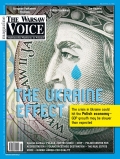

The Warsaw Voice | 05 listopad 2008

* Pokazana okładka tytułu jest aktualną okładką tytułu The Warsaw Voice. Kiosk24.pl nie gwarantuje, że czytany artykuł pochodzi z numeru, którego okładka jest prezentowana.
After months of bitter squabbling, the opposition, backed by President Lech Kaczyński, and the government have launched a series of talks.
First, Prime Minister Donald Tusk met with President Kaczyński’s twin brother Jarosław, leader of the opposition Law and Justice (PiS) party. A day later, the government held a formal meeting chaired by the president. The series of high-level talks was mainly devoted to measures Poland has to take to counteract threats resulting from the global financial crisis and the fallout of any long recession on emerging markets in Central and Eastern Europe. To discuss these problems,Tusk held a joint meeting with PiS’s Jarosław Kaczyński, while President Lech Kaczyński called a meeting of the Cabinet Council—a formal gathering of the government presided by the president. “We talked about joint initiatives by the government and the opposition in the face of the global crisis. The conclusion of the talks is that we are convinced we will be able to resist the consequences of the crisis,”
Tusk said after the Oct. 27 meeting with Jarosław Kaczyński. “I think the talks were very much to the point. For the first time I had the impression there was goodwill on the part of PiS,” he added. Jarosław Kaczyński also said he was glad the talks were held. “I had the impression that the prime minister saw the need to work with the opposition,” he said. According to Kaczyński, among the topics discussed was PiS’s position on government- proposed economic bills, which are supposed to stimulate the economy. Kaczyński promised to support the government in these matters.
But there are marked differences between the ruling coalition and PiS on Poland’s entry into the euro zone. “We understand that PiS is not interested in supporting the government on an early adoption of the euro at the end of 2011,” Tusk said. He added he wanted to talk about the issue with the leaders of all parliamentary parties and did not rule out holding a referendum on Poland’s euro-zone entry. The meeting of the Cabinet Council Oct. 28 started with a procedural dispute. Lech Kaczyński invited to the meeting Sławomir Skrzypek, governor of the central bank, who formally has no right to be present at such meetings because he is not a government member. Eventually, Lech Kaczyński managed to persuade Tusk in face-to-face talks that the meeting should be attended not only by Skrzypek but also presidential aides Piotr Kownacki and Michał Kamiński. Later Tusk commented: “I am getting accustomed to the creative treatment of the Polish constitution by the head of state.”
After the meeting, Tusk said he managed to persuade Kaczyński to take a “warmer” attitude towards Poland’s eurozone entry. He added Kaczyński made him believe he would approve of this plan or at least would treat it seriously. Tusk also said Kaczyński seemed ready to reconsider his position on bills of great importance for the country’s future finances. According to Kaczyński, no contentious issues emerged during the talks, apart from some slight differences of opinion concerning the powers of the finance minister and the president of the central bank.
After the two days of talks between the politicians who in recent months have been
communicating with each other only by way of aggressive comments to the media,
the atmosphere in Polish politics became unusually relaxed. “The meeting with Jarosław Kaczyński— to the point, though with differences of opinion—was already a good signal, but the atmosphere of the Cabinet Council meeting was beyond all expectations,” said Grzegorz Dolniak, deputy chairman of the parliamentary caucus of the Civic Platform (PO), the senior coalition partner. He said the meeting raised hopes that the president would be less eager to veto draft laws in the future. “If this [new attitude] were to concern the pension and healthcare bills one would have to admit that the meeting marked a real turning point,” he added.Presidential aide Michał Kamiński was equally enthusiastic. He said Kaczyński and Tusk seemed to agree on the president taking part in the European Union’s extraordinary summit scheduled for Nov. 7. In contrast to the last summit, which was a scene of an unprecedented dispute between the Polish president and the Polish government, this time the two sides have no objections to traveling together to the summit. Only the left-wing opposition voiced criticism of relations between the government, PiS and the president. Democratic Left Alliance (SLD) leader Grzegorz Napieralski said the warming of relations between Tusk and the Kaczyński brothers was temporary. He said the two sides realized that their image had suffered as a result of constant squabbling. Leszek Miller, the former left-wing prime minister, is also convinced that everything will soon “return to normal” and another political conflict will begin, as indicated by Lech Kaczyński’s vow to veto bills designed to reform the healthcare system, one of the most important goals of the Tusk government.
Witold żygulski
 Wróć do czytelni
Wróć do czytelni